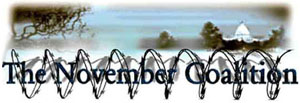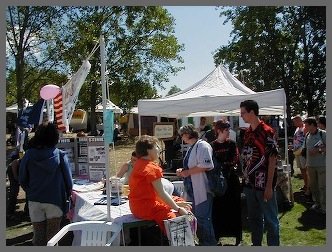
Seattle HempFest: Seattle, WA 2001
An informational table can be set up in a busy area of town, at community events, churches, libraries, civic clubs, conferences -- even at a city park near a sidewalk path that gets a lot of traffic. All you need is visibility and foot traffic, the more the better of course.
Each local Chamber of Commerce, Department of Parks and Recreation, Tourist Board and other public agencies has a list of festivals and community gatherings where an informational table display would be welcomed and appropriate.
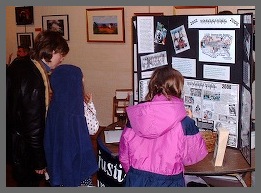
Journey for Justice: Bethesda, MD 2002
If you choose a park or public area to "table," you must get permission from your public authority. If you don't know which authority to ask, someone at City Hall can advise you about local regulations, required permits, and who issues them. Applying for a permit isn’t difficult, but remember that it may take a week or more to get approval; so plan appropriately.
If you are going to "table" on a regular basis, try to get a permit that will cover a span of time rather than go through the same permitting process each time. If you're required to obtain a permit each time you "table," pick up several copies of the application form to keep on file.
Regulations on selling merchandise in public differ from city to city. Accepting donations is almost always acceptable. Therefore, if you're offering items such as buttons or special project material, you can accept donations for them. Remember: by law you can't set a donation amount -- only suggest one.
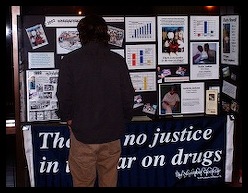
Journey for Justice: Orlando, FL 2003
If you didn’t know, November Coalition's home office makes display items available from a "gallery" of prisoner posters, to displays detailing subjects of drug war injustice.
Tabling Supplies
* Table -- card table, perhaps two of them if you aren't working alone, or a folding table of any type. If there's much carrying to be done, lightweight items are preferable.
* Chair -- plastic lawn chairs or folding chair, again lightweight. If you have volunteers to help you, remind each to bring a chair.
* Literature -- November Coalition can provide you with the current issue of The Razor Wire and there are various educational flyers that can be accessed online. Samples are included in the Organizers’ ToolKit
* Posters -- If permitted by regulations, posters can be secured to pointed sticks and driven into the ground in grassy areas. Be especially alert and careful before you pound into the ground not to damage unseen sprinkler systems (water lines are often only a few inches below the surface), preventing potential liability for expensive repairs! Lean posters on retaining walls, but if it’s windy, you’ll have problems.
* Displays -- A display on a portable easel can be made from an assortment of inexpensive products you can purchase at an office supply store -- use your imagination and available resources. If you are outside, wind is often problematic. A chain link fence makes an excellent backdrop for posters.
* Tablecloth -- a clean sheet or a plain tablecloth that will cover top and three exposed sides of your table. You can store boxes or bins under the table, keeping the area neat, and presenting a professional appearance.
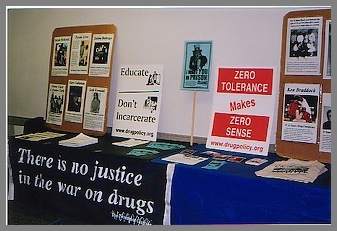
Deb Dedmon's work out of Las Vegas, NV 2005
* Donation jar -- A glass jar is heavier, and more breakable, than plastic or a metal can, but experience teaches that people are more likely to give when they see that others have given or are giving. To help initiate this process and ensure success, be sure to "seed" your donation jar with a few dollar bills, and a larger bill or two, and don't forget to throw in some loose change. You can pay yourself back later. Seeing is believing!
* Sign-up sheets -- You'll meet some people who'll want the opportunity to volunteer with you.
* Local, state, or national petitions -- There may be drug reform initiatives or petition projects that require signatures to be collected. Check with other local or state drug reform activists for current voter initiatives.
* Banner -- The November Coalition has a banner that reads simply, "There is no justice in the war on drugs." Banners can be fixed onto the back of your table by using thin wall conduit and clothesline rope. The banner can also be draped on the front of the table and fastened to the tablecloth.
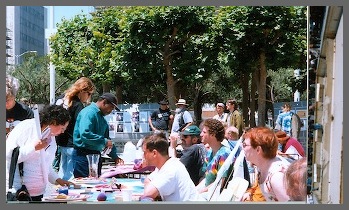
Anti-Prohibition Day: San Francisco, 1997
